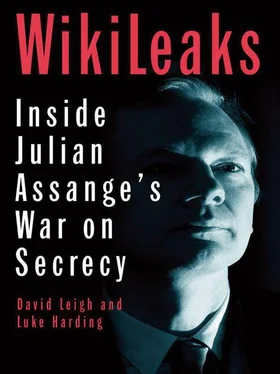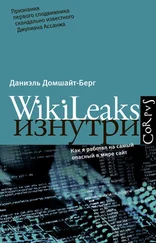Harding, Luke - WikiLeaks - Inside Julian Assange's War on Secrecy
Здесь есть возможность читать онлайн «Harding, Luke - WikiLeaks - Inside Julian Assange's War on Secrecy» весь текст электронной книги совершенно бесплатно (целиком полную версию без сокращений). В некоторых случаях можно слушать аудио, скачать через торрент в формате fb2 и присутствует краткое содержание. Жанр: Старинная литература, на английском языке. Описание произведения, (предисловие) а так же отзывы посетителей доступны на портале библиотеки ЛибКат.
- Название:WikiLeaks: Inside Julian Assange's War on Secrecy
- Автор:
- Жанр:
- Год:неизвестен
- ISBN:нет данных
- Рейтинг книги:3 / 5. Голосов: 1
-
Избранное:Добавить в избранное
- Отзывы:
-
Ваша оценка:
- 60
- 1
- 2
- 3
- 4
- 5
WikiLeaks: Inside Julian Assange's War on Secrecy: краткое содержание, описание и аннотация
Предлагаем к чтению аннотацию, описание, краткое содержание или предисловие (зависит от того, что написал сам автор книги «WikiLeaks: Inside Julian Assange's War on Secrecy»). Если вы не нашли необходимую информацию о книге — напишите в комментариях, мы постараемся отыскать её.
WikiLeaks: Inside Julian Assange's War on Secrecy — читать онлайн бесплатно полную книгу (весь текст) целиком
Ниже представлен текст книги, разбитый по страницам. Система сохранения места последней прочитанной страницы, позволяет с удобством читать онлайн бесплатно книгу «WikiLeaks: Inside Julian Assange's War on Secrecy», без необходимости каждый раз заново искать на чём Вы остановились. Поставьте закладку, и сможете в любой момент перейти на страницу, на которой закончили чтение.
Интервал:
Закладка:
Conservatives - Not Prepared
4. (C/NF) Conservative leaders David Cameron and George Osborne do not fully grasp the pressures they will face when attempting to cut back on spending, when “hundreds of government officials will make pleas of why their budgets should not be reduced,” stated King. In recent meetings with them, he has pressed for details about how they plan to tackle the debt, but received only generalities in return. Both Cameron and Osborne have a tendency to think about issues only in terms of politics, and how they might affect Tory electorability. King also raised concerns that Osborne’s dual roles as Shadow Chancellor of the Exchequer but also as the Party’s general election coordinator could create potential problems in the approach on economic issues.
5. (C/NF) King also expressed concern about the Tory party’s lack of depth. Cameron and Osborne have only a few advisors, and seemed resistant to reaching out beyond their small inner circle. The Cameron/Osborne partnership was not unlike the Tony Blair/Gordon Brown team of New Labour’s early years, when both worked well together when part of the opposition party, but fissures developed - for many reasons - once Labour was in power. Similar tensions could arise if Cameron and Osborne disagreed on how to handle the deficit.
7. (C/NF) The euro-zone’s move to greater political cohesion could poise some disadvantages for the UK, King speculated. During the February 16 ECOFIN meeting, euro-zone governments politely listened to Chancellor Darling when he commented on the situation in Greece, but he was not invited to attend internal discussions since the UK is not part of the euro-zone. It would be incumbent for the UK to demonstrate that it has something meaningful to say and to be constructively engaged in the EU, should this greater political cohesion among the euro-zone governments occur, commented King.
NICOLAS SARKOZY STRIKES FEAR
INTO HIS ADVISORS
Friday, 04 December 2009, 11:49
CONFIDENTIAL SECTION 01 OF 04 PARIS 001638
NOFORN
Classified By: Ambassador Charles Rivkin for reasons 1.4(b) and (d).
1. (C/NF) Summary. At the mid-point of his five-year term, French President Sarkozy continues to be the dominant, virtually unchallenged, political force in France. Slowed in domestic reform efforts by entrenched interests and the world-wide financial crisis, Sarkozy is increasingly focused on successfully leveraging France’s foreign policy influence on the global stage. Ambitious and action-oriented, Sarkozy doesn’t hesitate to break traditional French policies and reach out to new partners, from Saudi Arabia and Syria to India and Brazil. His impatience for results and desire to seize the initiative – with or without the support of international partners and his own advisors – challenges us to channel his impulsive proposals into constructive directions with an eye to long-term results. Sarkozy himself is firmly convinced of the need for a strong transatlantic partnership and he has long desired to be THE major partner to the U.S. in Europe, whether on climate change and non-proliferation or Iran and the Middle East. Our effort to secure increased French contributions in Afghanistan offers an interesting perspective on the centralization of key decision-making powers in the French President and how to best work with Sarkozy as a valued, and valuable, partner. With high-profile events like the Non-Proliferation Treaty (NPT) prep-com next spring, and Sarkozy preparing to lead France’s chairmanship of the G-8/G-20 in 2011, we believe we can best secure our interests across a broad front through continued close consultations with our French partners (including, and perhaps especially, at the highest levels), with an eye to leveraging Sarkozy’s strong political standing, desire for action, and willingness to make difficult decisions into force multipliers for our foreign policy interests. End Summary.
DOMESTIC DRAMA BUT NO DOMESTIC OPPOSITION
2. (C/NF) Sarkozy’s domestic standing is virtually unchallenged despite lagging opinion polls which place his personal approval ratings at 39 percent. His center-right UMP party controls both houses of parliament, and opposition leaders in France have spent the past two years fighting among themselves rather than mounting any serious political challenge to the incumbent president. Sarkozy’s policy of “openness” in appointing opposition politicians to high-profile positions has contributed to the leadership drain on the left. IMF President Dominique Strauss-Kahn and FM Kouchner are just two examples of this successful political ploy. Despite this political security – or perhaps because of it – there is some internal grumbling about Sarkozy’s high handed style within his own party, revealed by the recent attempt to name his 23-year-old son Jean Sarkozy, who is still an undergraduate student, to a position at the head of Paris’s most prestigious business development commission. A brilliant political tactician, Sarkozy is raising the profile of the March 2010 regional elections to rally his base and steal voters from the far right as part of a ramp-up to his re-election bid in 2012. While this makes him more sensitive to the near-term domestic political impact of certain foreign policy issues (like Afghanistan), his domestic stature remains fundamentally secure, freeing him to focus on his goal of leveraging French power in Europe and globally.
FOREIGN POLICY SUCCESSES AND CHALLENGES
3. (C/NF) The net result of Sarkozy’s dominance of the domestic political scene is that he is also one of the most secure leaders in Europe, with no awkward coalition partner or imminent presidential elections to distract or hinder him. Sarkozy occasionally recognizes that to be heard on the world stage – whether on strategic questions or the global financial crisis – France’s voice is amplified when speaking in concert with others. Sarkozy has worked hard to successfully parlay an initially awkward personal relationship with German Chancellor Merkel into a smoothly
PARIS 00001638 002 OF 004
coordinated tandem that drives much of European policy. Likewise, he will frequently pair with Merkel and UK PM Brown to add needed clout to messages in Brussels and Washington. Sarkozy’s ability to leverage his (and France’s) voice on the world stage by building on strategic partnerships is one of his greatest strengths; one of his greatest weaknesses, however, may be his impatience and penchant to launch proposals with insufficient consultation with other major players.
4. (C/NF) Sarkozy’s most visible successes to date are largely in the foreign affairs domain, with his greatest achievements within Europe. He championed the Lisbon treaty in his first months in office, helping to end the stalemate over reform of EU institutions. This was succeeded by his leadership of the rotating EU presidency in the second half of 2008, which included the creation of the Union for the Mediterranean (UfM), the launch of the EU’s counter-piracy operation, and his negotiation of a cease-fire after the Russian invasion of Georgia. Characteristically, he didn’t hesitate to disregard European sensitivities by attempting to retain the lead on specific portfolios where he doubted the Czech ability to provide the necessary follow-on EU lead after Prague took over the rotating presidency in January 2009. On security issues, Sarkozy is equally bold. He personally authorized additional French troops for Afghanistan at the 2008 Bucharest NATO summit and this year he fought to bring France back into NATO’s integrated military command, reversing more than 40 years of bipartisan French policy, in spite of strong skepticism within his own party and intense opposition from others.
NEW PARTNERS, NEW IDEAS
5. (C/NF) In a departure from previous French leaders, Sarkozy has also devoted a great deal of effort to reaching out bilaterally to countries like Israel, Saudi Arabia and Syria, recognizing that they are major players in the Middle East where French ambitions have been frustrated. French officials are convinced that Sarkozy’s outreach to Syria has made Syrian President al Asad a more productive partner in resolving Middle East issues (although they are hard-pressed to provide concrete examples of a change). Sarkozy fully recognizes the growing role played by emerging powers like Brazil (he has meet with Brazilian President Lula nine times in the past two years) and India (whose troops he invited to star in the July 14, 2009 military parade). He lobbied successfully for the G-20 meeting in Washington to address the global financial crisis, and he supports an expanded UN Security Council, which earns him additional popularity among rising powers. The Elysee has also looked to Brazil as a partner in climate change negotiations and a buyer of French defense equipment – including potentially the first overseas sale of the Rafale fighter aircraft. All of these outreach efforts stem from genuine convictions as well as an eye to the image of France at the center of a global network of influential leaders.
Читать дальшеИнтервал:
Закладка:
Похожие книги на «WikiLeaks: Inside Julian Assange's War on Secrecy»
Представляем Вашему вниманию похожие книги на «WikiLeaks: Inside Julian Assange's War on Secrecy» списком для выбора. Мы отобрали схожую по названию и смыслу литературу в надежде предоставить читателям больше вариантов отыскать новые, интересные, ещё непрочитанные произведения.
Обсуждение, отзывы о книге «WikiLeaks: Inside Julian Assange's War on Secrecy» и просто собственные мнения читателей. Оставьте ваши комментарии, напишите, что Вы думаете о произведении, его смысле или главных героях. Укажите что конкретно понравилось, а что нет, и почему Вы так считаете.












